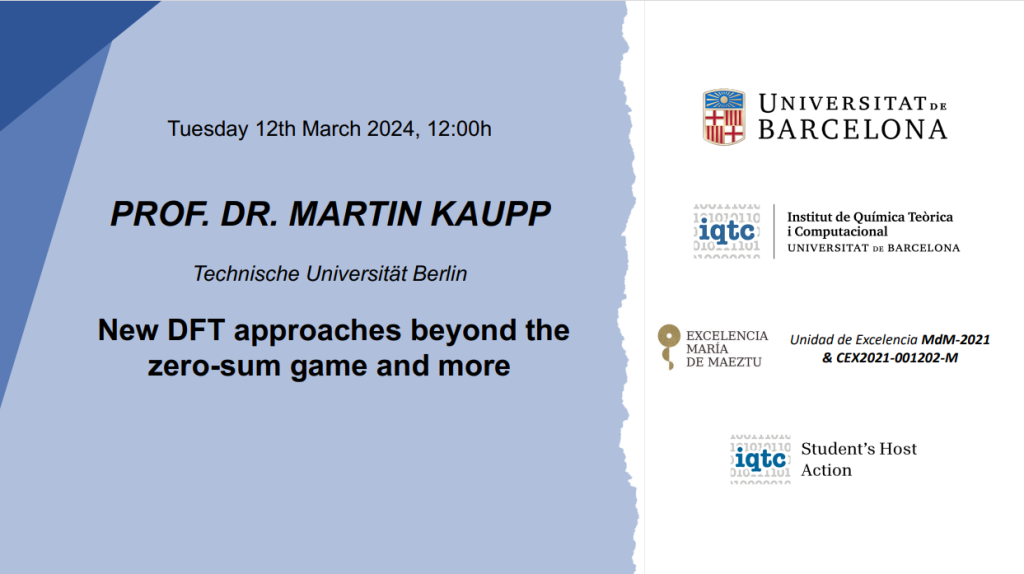IQTC Seminar: Martin Kaupp
New DFT approaches beyond the zero-sum game and more
Tuesday March 12th 2024, 12:00h
Zoom

I will give an overview over some of the recent, exciting progress we have made in the field of local hybrid functionals[1] (LHs) and beyond, which I think opens a new era in the field. Position-dependent exact-exchange admixture of LHs like LH20t[2] allows a flexible treatment of properties depending on different spatial regions, e.g. in the core, valence, far away from the nuclei, or in different parts of a larger composite system. This has been explored, e.g., for NMR and EPR parameters, including the setup of new benchmark sets of unprecedented scope for NMR shifts for main-group and transition-metal nuclei.[3] We recently extended the efficient implementation of LHs in Turbomole to range-separated LHs[4] and reported the wLH22t long-range corrected RSLH,[4] which rivals the optimally-tuned RSH approach for quasiparticle energies in molecular electronics, without the need for system-dependent tuning.[5] The most exciting progress is the introduction of strong-correlation factors into LHs[6] and RSLHs[7] that allows us to escape the usual zero-sum game between reducing fractional charge errors (self-interaction errors) and fractional spin errors (static correlation errors). This provides powerful new DFT approaches and opens a wide range of possible applications, including in particular for transition-metal systems.[8] Many of the new methods have just become available with Turbomole 7.8. Time permitting I will also talk about spin-state splittings of 3d complexes, where the new CASPT2+dMRCI composite benchmark method[7,8] offers new insights, and I may address the recent solution to the previously controversial puzzle of the mixed-valent Rydberg state of dimethylpiperazine.[9]
Literature:
[1] T. M. Maier, A.V. Arbuznikov, M. Kaupp. Wiley Interdiscip. Rev.-Comput. Mol. Sci. 2019, e1378.
[2] M. Haasler, T. M. Maier, R. Grotjahn, S. Gückel, A. V. Arbuznikov, M. Kaupp. J. Chem. Theory Comput. 2020, 16, 5645.
[3 See, e.g.: C. J. Schattenberg, M. Lehmann, M. Bühl, M. Kaupp J. Chem. Theory Comput. 2022, 18, 273. C. J. Schattenberg, M. Kaupp J. Chem. Theory Comput. 2021, 17, 7602.
[4] S. Fürst, M. Haasler, R. Grotjahn, M. Kaupp J. Chem. Theory Comput. 2023, 19, 488.
[5] S. Fürst, M. Kaupp J. Chem. Theory Comput. 2023, 19, 3146.
[6] A. Wodyński, M. Kaupp J. Chem. Theory Comput. 2022, 18, 6111. A. Wodyński, A. V. Arbuznikov, M. Kaupp J. Chem. Phys. 2023, 158, 244117.
You can join the talk via zoom: https://ub-edu.zoom.us/j/92353174616?pwd=SnAyMno3WXRrZWZaYzdxcXRnYzdWZz09
Reunion ID: 923 5317 4616
Access code: 654307
Watch the full talk here: https://www.youtube.com/watch?v=87nuUfTlpCU
